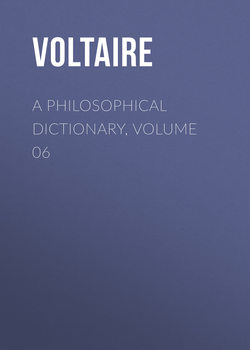Читать книгу A Philosophical Dictionary, Volume 06 - Voltaire, Вольтер - Страница 7
HERESY
SECTION II
ОглавлениеOf the Extirpation of Heresies
It appears to me that, in relation to heresies, we ought to distinguish between opinion and faction. From the earliest times of Christianity opinions were divided, as we have already seen. The Christians of Alexandria did not think, on many points, like those of Antioch. The Achaians were opposed to the Asiatics. This difference has existed through all past periods of our religion, and probably will always continue. Jesus Christ, who might have united all believers in the same sentiment, has not, in fact, done so; we must, therefore, presume that He did not desire it, and that it was His design to exercise in all churches the spirit of indulgence and charity, by permitting the existence of different systems of faith, while all should be united in acknowledging Him for their chief and master. All the varying sects, a long while tolerated by the emperors, or concealed from their observation, had no power to persecute and proscribe one another, as they were all equally subject to the Roman magistrates. They possessed only the power of disputing with each other. When the magistrates prosecuted them, they all claimed the rights of nature. They said: "Permit us to worship God in peace; do not deprive us of the liberty you allow to the Jews."
All the different sects existing at present may hold the same language to those who oppress them. They may say to the nations who have granted privileges to the Jews: Treat us as you treat these sons of Jacob; let us, like them, worship God according to the dictates of conscience. Our opinion is not more injurious to your state or realm than Judaism. You tolerate the enemies of Jesus Christ; tolerate us, therefore, who adore Jesus Christ, and differ from yourselves only upon subtle points of theology; do not deprive yourselves of the services of useful subjects. It is of consequence to you to obtain their labor and skill in your manufactures, your marine, and your agriculture, and it is of no consequence at all to you that they hold a few articles of faith different from your own. What you want is their work, and not their catechism.
Faction is a thing perfectly different. It always happens, as a matter of necessity, that a persecuted sect degenerates into a faction. The oppressed unite, and console and encourage one another. They have more industry to strengthen their party than the dominant sect has for their extermination. To crush them or be crushed by them is the inevitable alternative. Such was the case after the persecution raised in 303 by the Cæsar, Galerius, during the last two years of the reign of Diocletian. The Christians, after having been favored by Diocletian for the long period of eighteen years, had become too numerous and wealthy to be extirpated. They joined the party of Constantius Chlorus; they fought for Constantine his son; and a complete revolution took place in the empire.
We may compare small things to great, when both are under the direction of the same principle or spirit. A similar revolution happened in Holland, in Scotland, and in Switzerland. When Ferdinand and Isabella expelled from Spain the Jews, – who were settled there not merely before the reigning dynasty, but before the Moors and Goths, and even the Carthaginians – the Jews would have effected a revolution in that country if they had been as warlike as they were opulent, and if they could have come to an understanding with the Arabs.
In a word, no sect has ever changed the government of a country but when it was furnished with arms by despair. Mahomet himself would not have succeeded had he not been expelled from Mecca and a price set upon his head.
If you are desirous, therefore, to prevent the overflow of a state by any sect, show it toleration. Imitate the wise conduct exhibited at the present day by Germany, England, Holland, Denmark, and Russia. There is no other policy to be adopted with respect to a new sect than to destroy, without remorse, both leaders and followers, men, women, and children, without a single exception, or to tolerate them when they are numerous. The first method is that of a monster, the second that of a sage.
Bind to the state all the subjects of that state by their interest; let the Quaker and the Turk find their advantage in living under your laws. Religion is between God and man; civil law is between you and your people.
